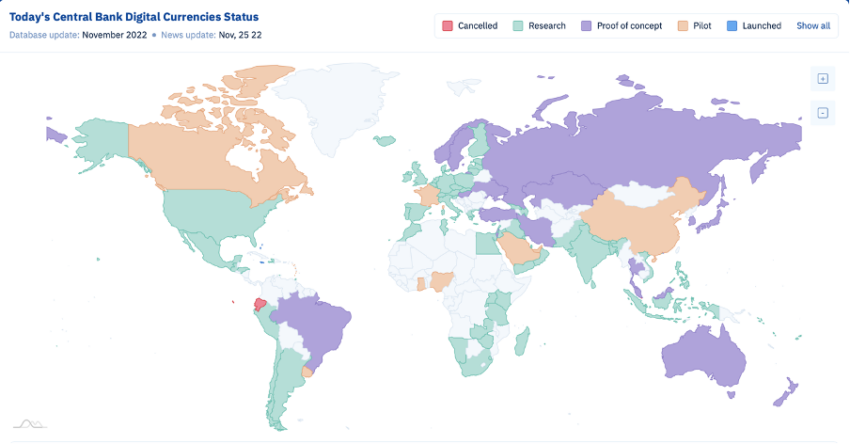A recent survey on the topic of central bank digital currency (CBDC) development in Africa gives some fresh insight into their evolution and regulators’ motivations and concerns. Nonetheless, analysts worldwide are raising questions about CBDC implementation, be it in Africa, China, or the U.S.
Central bank digital currencies, popularly known as CBDCs, have been touted as the next step toward financial inclusion. They have the potential to transform the financial system specific to a region. So much potential that government bodies are collaborating with regulatory bodies to solidify their control over their respective payment systems.
From central banking and tech-driven institutions to politicians - many have their fingers on the pulse of this latest payment innovation. Places like China and Russia have already launched pilot programs, while others, such as the US, are in the research phase. But another critical area for CBDC development is in Africa. Severe cracks have emerged in CBDC operations in this region, which arguably, could see the most benefits.
African CBDCs: The what and why
CBDCs are envisioned as a tool to bolster the monetary system with the central bank at the core to support safe, low-cost, and inclusive payments while promoting innovation. The digital currencies could bring financial services to people who previously didn’t have bank accounts, especially if designed for offline use. In remote areas without internet access, digital transactions can be made at little or no cost using simple feature phones. This has to potential to further foster cross-border transfers and payments.

Sub-Saharan Africa remains the most expensive region to send and receive money, with an average cost of just under 8% of the transfer amount. CBDCs could ideally help counter this setback and promote financial inclusion within the African region, especially compared to other EMEs (emerging market economies). While many regions across the African continent are exploring CBDC implementation, Nigeria and Ghana are leading the pack.
Status report on CBDCs in Africa
The interest of African central banks in CBDCs has recently shot up. While all those surveyed are analyzing CBDCs, only a few have projects at advanced stages (pilot or live).

Several sub-Saharan African central banks are either researching or are in the pilot phase of a digital currency following Nigeria’s introduction of the e-Naira and Ghana’s e-cedi. There are still many risks and challenges, including data privacy, cyber-attacks, and public access to digital infrastructure.
Visible cracks in the infrastructure
A recent report highlighted some key differences and varying motivations in the African CBDC movement. The Bank for International Settlements (BIS) surveyed 19 African central banks that served as the report’s base. A direct threat to freedom that a CBDC might pose is closely related to its threat to privacy. Per the report, the main operational challenge noted is cyber risk, even more in Africa than elsewhere.
A new survey with 19 African central banks shows that the main concern regarding #CBDCs is cybersecurity, even more than elsewhere. High operational burden for the central bank is also a bigger concern than in other regions https://t.co/FzkCq5POOD pic.twitter.com/XqYHjRwyRv
— Bank for International Settlements (@BIS_org) November 24, 2022
A successful cyberattack on a CBDC could cause severe and widespread damage and erode the basis of an entire region’s economy. Attacks on credit card systems and databases containing consumer credit profiles already offer a glimpse of the potential threats involved. Another significant challenge is the operational burden of maintaining a CBDC. The BIS survey notes:
“Here African central banks highlight aspects very similar to other EMEs: network resilience, the cost, availability, and combinability of technologies, and their scalability and functionalities. The operational cost of such a complex system is high.” - BIS central bank survey
Meanwhile, the risk of low adoption and bank disintegration also ranked among the top concerns. Nigeria's central bank digital currency has been adopted by just 0.50% of the country’s population. Following this, different analysts proclaimed that “the eNaira has been a massive failure.”








